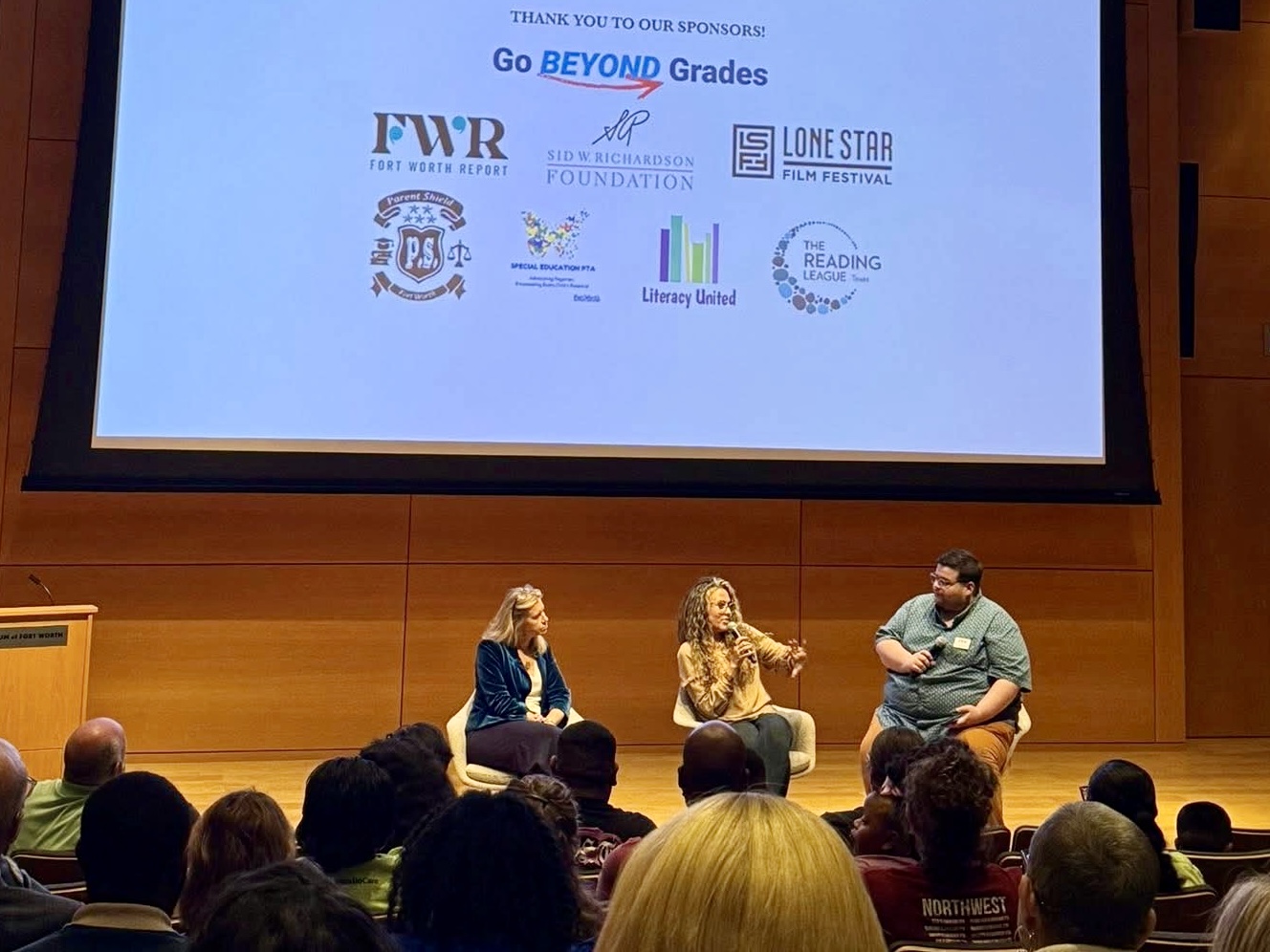Before the lights dimmed Monday night at the Modern Art Museum of Fort Worth, Karen Molinar was called upon to read in front of the class.
Words twisted, letters jumbled together and the room filled with nervous laughter as some of the Fort Worth ISD superintendent’s “classmates” — a mix of parents, educators and community leaders — fumbled through a reading exercise. Some, when called on, asked for nurse passes.
Molinar, a former reading teacher, gave another kind of excuse any child struggling to read might use when the words just won’t come together.
“My mom did not pack my glasses,” she said.
The class, as organizer Caroline James later explained, was a simulation — a lesson in what kids with dyslexia feel every day: “You feel disoriented, confused, embarrassed,” she told the crowd.
The brief exercise set the tone for the screening of “Left Behind,” a feature-length documentary that follows five mothers fighting to open New York City’s first public school for students with dyslexia. The film, directed by Emmy Award-winning producer Anna Toomey, framed literacy as a civil right — and the inability to read as a systemic failure.
“When your child has dyslexia, you become an activist because you see the injustice so clearly,” Toomey told the crowd afterward.
Joining her on stage was Naomi Peña, one of the mothers featured in the film and a co-founder of the Literacy Academy Collective. Peña began the post-screening panel discussion with a simple show of hands: Who in the audience, she asked, had dyslexia, suspected it or knew someone who did?
Nearly every hand went up.
“I want people to be seen,” Peña said, scanning the crowd. “We are asking children to do something really hard — and the adults aren’t giving them the proper instruction. Yet we hold them to the same standard as everyone else.”
She explained why her group insisted the new school be public, not charter or private.
“When it’s part of the public school system, it’s owned by the public,” she said. “You’re putting a stake in the ground and saying, ‘We’re going to support these children.’”
The audience nodded as she described how trained teachers, trauma-informed support and explicit reading instruction can change outcomes.
“One school wasn’t enough, so we opened a second school,” Peña said. “The goal is five or six.”
The screening and conversation unspooled amid the state takeover of Fort Worth ISD, where early reading has become a top priority. Panelists said the film’s themes — advocacy, urgency and evidence-based instruction — are the same challenges local families face.
Panelists reminded attendees that parents in Texas have a right to request dyslexia evaluations, and districts must respond within 45 days. Not every state has that protection.
James, a consultant for the Sid W. Richardson Foundation, framed the evening as a bridge between empathy and action.
And when Peña was asked what advice she’d give parents in Fort Worth, she didn’t hesitate.
“Your story matters,” she said. “Be ‘those moms.’ Be relentless. It’s exhausting and not fun, but that’s the only way you’re going to get this done.”
She urged families to start small — with two or three parents at a table — and focus on shared goals.
“We fight so hard to find differences so we don’t have to talk to each other,” Peña said. “But what we’ve discovered is that we’re actually more alike than you imagine. And if we agree on literacy, then we can work together.”
James closed the night by inviting attendees to volunteer with Reading Partners North Texas and Literacy United, nonprofits that pair adults with struggling readers. Both organizations had tables set up near the theater exit.
As the crowd filed out, several parents lingered — some talking next steps, others taking photos with Toomey and Peña.
For many, the message was simple: Awareness isn’t enough.
Disclosure: The Sid W. Richardson Foundation is a financial supporter of the Fort Worth Report. News decisions are made independently of our board members and financial supporters. Read more about our editorial independence policy here.
Matthew Sgroi is an education reporter for the Fort Worth Report. Contact him at matthew.sgroi@fortworthreport.org or @matthewsgroi1.
At the Fort Worth Report, news decisions are made independently of our board members and financial supporters. Read more about our editorial independence policy here.
Related
Fort Worth Report is certified by the Journalism Trust Initiative for adhering to standards for ethical journalism.
Republish This Story
Republishing is free for noncommercial entities. Commercial entities are prohibited without a licensing agreement. Contact us for details.

